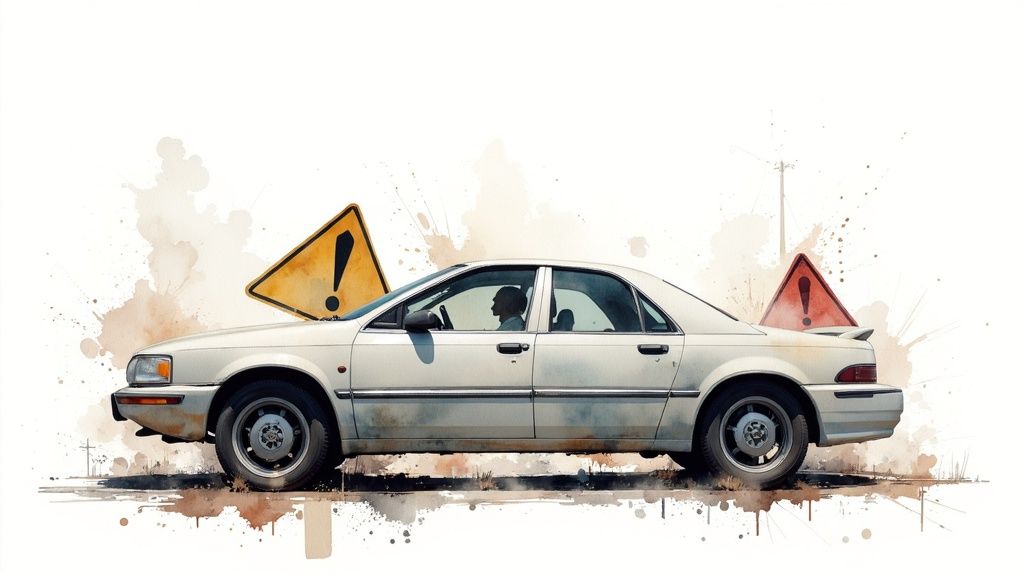Decoding Your Existing Coverage: What You Already Have

Before you even think about picking up those rental car keys, it's essential to understand your current insurance coverage. Taking this proactive step can save you money and prevent unwanted surprises later on. Let's explore what protection you probably already have and where you might need a little extra coverage.
Understanding Your Personal Auto Policy
Your personal auto insurance often covers rental cars, but the extent of this coverage can differ. Most policies cover rentals within the U.S. and Canada. However, there are important distinctions between your personal policy and the rental agency's insurance offerings. For instance, your liability coverage will likely transfer to the rental, protecting you if you're at fault in an accident. But what about damage to the rental car itself?
Collision and Comprehensive Coverage: Bridging the Gap
If you have collision and comprehensive coverage on your personal vehicle, it usually extends to rentals. This is where the value gap can sometimes be an issue. If the rental car is worth significantly more than your own car, your coverage might fall short of the total repair or replacement cost.
This is particularly important if you're driving a less expensive car and renting something like a luxury vehicle or SUV. This means that even with what seems like full coverage, you could still be responsible for substantial out-of-pocket expenses.
Talking to Your Insurer: Essential Questions
Before you reserve your next rental, it's a good idea to chat with your insurance provider. Getting clarity on your coverage beforehand helps you make smart decisions at the rental counter.
Ask specifically about your liability limits, the extent of your collision and comprehensive coverage on rentals, and any deductibles that might apply. Knowing these details will help you determine the actual value of the rental company's insurance options. For further reading on the topic of rental car insurance, check out this helpful article: Should You Buy Car Rental Insurance? You might also find this interesting: How to Master Car Rentals in Albania.
Deductibles and Other Considerations
Don't forget about your deductible! This is the amount you'll have to pay out-of-pocket before your insurance coverage begins. If your deductible is high, even a small fender bender could become a costly problem.
Also, keep in mind that some personal policies exclude certain types of rentals, such as high-performance or off-road vehicles. Knowing about these exclusions is key to avoiding unexpected charges. By understanding your existing coverage, you're taking the first step towards making a well-informed decision about rental car insurance. As of August 10, 2005, the Graves Amendment (49 U.S.C. § 30106) generally places the responsibility on the renter's personal insurance unless state law or rental agreements specify otherwise.
Navigating Rental Counter Options: Coverage Worth Considering

Now that you have a better grasp of your current insurance coverage, let's explore those often-confusing insurance options offered at the rental car counter. Making these decisions under pressure can be tricky, so we'll break down the common types and help you determine what you really need.
Collision Damage Waiver (CDW)
The Collision Damage Waiver (CDW) is usually the first option presented. It's important to understand that a CDW isn't technically insurance. It's a waiver that protects you from financial responsibility for damage to the rental vehicle in specific situations, such as a collision.
This can be valuable if your personal auto insurance policy doesn't extend to rental cars or if you have a high deductible. However, CDWs often have exclusions, such as damage from off-road driving or theft.
Supplemental Liability Protection (SLP)
Supplemental Liability Protection (SLP), on the other hand, is insurance. SLP gives you extra liability coverage beyond what your personal auto policy may provide. This is essential to consider if you carry limited liability coverage on your own car.
If you're involved in an accident and deemed at fault, SLP helps protect your assets from potential lawsuits. Imagine causing an accident in a rental where the damages and medical expenses exceed your existing liability limits. SLP can cover the difference, protecting you from a potentially devastating financial blow. This is definitely something worth thinking about. You might be interested in: Our Terms and Conditions.
Personal Accident Insurance (PAI)
Lastly, there's Personal Accident Insurance (PAI). This covers medical expenses and accidental death benefits for you and your passengers. Before opting for PAI, carefully review your current health and auto insurance policies.
You likely have similar coverage already. Ask yourself if PAI truly offers additional benefits. If you have comprehensive health and auto insurance, PAI could be redundant.
Making Informed Choices at the Counter
Renting a car shouldn't be a stressful experience. By understanding the types of insurance available, you can confidently make informed decisions. Consider your existing coverage, how much risk you're comfortable with, and your trip details. Should you purchase rental car insurance? It truly depends.
Some travelers decline all the extras, comfortable with their current insurance. Others, particularly those with minimal coverage or traveling internationally, might want the extra security. The key is to gather all the information and make the best choice for your situation.
To help you make the best decision, take a look at this helpful table:
Rental Car Insurance Options Comparison
This table compares the different types of rental car insurance, what they cover, typical costs, and when they might be worth purchasing.
| Insurance Type | What It Covers | Average Cost | Worth It If… |
|---|---|---|---|
| Collision Damage Waiver (CDW) | Damage to the rental car | $10-$30/day | Your personal auto policy doesn't cover rental car damage or you have a high deductible. |
| Supplemental Liability Protection (SLP) | Liability for injuries or damages to others | $7-$15/day | You have limited liability coverage on your own vehicle. |
| Personal Accident Insurance (PAI) | Medical expenses and accidental death benefits for you and your passengers | $3-$7/day | You don't have sufficient health or personal injury protection coverage. |
Remember, these costs are averages and can vary. Always confirm the exact pricing at the rental counter. Deciding on rental car insurance can seem complicated, but by understanding these options, you can navigate the rental counter with confidence.
The Legal Landscape: Understanding Your True Liability

Renting a car can be exciting, but it's important to understand the legalities involved, especially when it comes to insurance. This isn't just about signing forms; it's about protecting your finances. Let's explore the legal side of renting a car and how it affects your insurance options.
The Graves Amendment: Shifting Responsibility
The Graves Amendment, enacted in 2005, significantly altered the legal landscape. This federal law generally shields rental car companies from liability when a renter causes an accident, unless the company itself was at fault.
This means your personal auto insurance typically becomes the primary coverage. So, when deciding about rental car insurance, grasp the legal framework and potential financial consequences. Understanding this law is essential for making informed decisions about your coverage.
The Graves Amendment essentially puts the responsibility back on the renter. If you only have liability insurance and damage the rental, your policy might not cover the damage unless you have purchased supplemental coverage. In some states, like Indiana, the renter's policy is generally primary unless rentals are specifically excluded. Learn more about these state-specific regulations. This shift in responsibility underscores the importance of having adequate personal car insurance.
State Laws: A Variety of Rules
State laws add another layer of complexity, varying considerably concerning rental car insurance. Some states mandate specific coverage levels, while others automatically prioritize your personal insurance.
This is especially important for interstate travel. Imagine crossing state lines: one state might require extra liability coverage for rentals, while your home state doesn't. Knowing these differences is crucial for avoiding gaps in your coverage. Before your trip, look into the specific rules of your destination. This will help you comply with local laws and ensure adequate protection. You might also find this helpful: Everything You Need to Know About TPL Insurance for Car Rentals in Albania.
International Rentals: New Terrain
Renting a car internationally presents its own set of challenges. Legal systems and insurance rules can differ greatly from your home country. Some countries require particular policies, regardless of your current coverage. Others may have minimal requirements, leaving you vulnerable to greater financial risk.
Before renting abroad, carefully research local laws and insurance requirements. Talk to your insurance provider to see how your policy works internationally. This helps navigate the unfamiliar landscape and make smart choices about your coverage needs.
For example, some countries require third-party liability insurance. This covers damage or injuries you cause to others, but not damage to the rental car itself. Understanding these nuances is key to a smooth and worry-free rental experience. Doing your homework beforehand will help you decide about rental car insurance and ensure you're protected wherever you go.
Credit Card Protection: The Fine Print That Matters

Your credit card might seem like a simple solution for rental car insurance. But it's important to understand the specifics of your card's coverage to avoid unexpected costs. This section explores the details you need to know before relying solely on your credit card for rental car insurance.
Primary vs. Secondary Coverage: A Critical Distinction
A key factor in credit card rental car coverage is whether it's primary or secondary. Primary coverage takes effect immediately in case of an accident or damage, regardless of any other insurance you have. Secondary coverage, on the other hand, applies only after your personal auto insurance has been used.
This distinction can significantly affect your expenses. Secondary coverage may require you to pay your deductible and could lead to higher premiums. Before you decline the rental company's insurance, check if your card offers primary or secondary coverage. This small detail can make a big difference in your financial protection.
Exclusions and Limitations: What Your Card Doesn't Cover
While helpful, credit card rental car insurance often has limitations and exclusions. Certain vehicles, such as luxury cars, exotic vehicles, or large vans, might not be covered. Coverage may also be limited to specific geographic areas or rental durations.
Some cards, for instance, restrict coverage to 15 days within the U.S. or exclude international rentals entirely. Damage from activities like off-road driving might also be excluded. Review your card's terms and conditions to avoid surprises if you need to file a claim. Understanding what isn't covered is just as important as knowing what is.
Activating and Using Your Credit Card's Protection
Using your credit card's rental car insurance typically involves specific steps. Generally, you must decline the rental company's Collision Damage Waiver (CDW) and pay for the entire rental with the card providing the coverage.
Documentation is crucial for a smooth claims process. Take photos of the car before and after your rental, documenting any existing damage. Keep copies of all rental agreements and insurance documents. This preparation will be invaluable if you need to file a claim.
Credit Card Rental Coverage Limitations
The following table highlights common limitations and exclusions in credit card rental car coverage. It's a good idea to review this information before deciding against the rental company's insurance.
| Limitation Type | Common Restrictions | Potential Impact | How to Verify |
|---|---|---|---|
| Vehicle Type | Exclusions for luxury cars, exotic vehicles, vans, trucks, etc. | Coverage may be denied for damages to excluded vehicles. | Check your card's benefits guide or contact the issuer. |
| Rental Duration | Limits on the number of rental days covered (e.g., 15 days). | Coverage may lapse after a certain period, leaving you exposed. | Review your card's rental car insurance policy details. |
| Geographic Location | Restrictions on coverage in certain countries or regions. | Coverage may not apply in your destination, especially for international travel. | Consult your card's benefit guide for coverage territories. |
| Specific Activities | Exclusions for off-road driving, racing, or other prohibited uses. | Damage incurred during excluded activities won't be covered. | Carefully read the exclusions section of your card's policy. |
Understanding these limitations helps you decide if you need extra rental car insurance. Consider your circumstances, the potential risks, and your credit card benefits. For some trips, your personal policy and credit card coverage may be sufficient. In other cases, purchasing supplemental insurance from the rental counter might be a good idea.
The True Cost Analysis: Beyond Daily Rates
Renting a car can be exciting, but it's easy to get caught up in the initial price and overlook the finer details, especially when it comes to insurance. While that daily rate at the counter might seem appealing, understanding the full scope of your potential costs is crucial for a truly informed decision. Let's delve a bit deeper and look beyond the surface.
Calculating Your True Financial Exposure
A smart renter thinks beyond the daily insurance premium and considers several key factors. Your deductible, the amount you pay out-of-pocket before insurance coverage kicks in, is a prime example. A high deductible might lower your daily rate, but it could significantly increase your expenses if an accident occurs.
Coverage limits are equally important. These define the maximum amount the insurance will cover. If the repair or liability costs exceed your limits, you're responsible for the remaining balance. This could lead to substantial, unexpected costs. For more helpful tips, you might be interested in this article: Read also: How to Master Car Rentals.
Don't forget about potential uncovered expenses. Many rental car insurance policies exclude certain types of damage, such as off-road incidents. Understanding these exclusions can help you avoid unpleasant surprises. Also, keep in mind that the overall cost of auto insurance is on the rise. In 2022, the national average expenditure increased by 6.1% to $1,127, up from $1,062 in 2021. For more detailed statistics, check out this resource. These rising costs and varying state laws regarding primary insurance coverage should factor into your decision-making process.
The Impact of Rising Repair Costs and Vehicle Values
Repair costs and vehicle values are constantly fluctuating, directly impacting your potential out-of-pocket expenses. As these costs rise, so does your financial risk if you're underinsured. Higher vehicle values mean higher replacement costs, making adequate coverage even more critical.
What was sufficient coverage a few years ago might not protect you from a significant financial burden today. Regularly reviewing your insurance policies and adjusting coverage as needed is a good practice.
International Rentals: A Different Equation
Renting a car internationally adds another layer of complexity to insurance considerations. Different countries have unique legal systems and insurance regulations. Some may require specific coverage types or levels, regardless of your existing policy. Others may have minimal legal requirements, increasing your risk.
Before traveling abroad, research the local laws and insurance requirements at your destination. Contact your insurance provider to understand how your current policy applies in the country you’re visiting. This proactive approach will help you avoid unexpected costs and enjoy a worry-free trip.
Location and Trip-Specific Considerations That Change Everything
Should you get rental car insurance? The answer really depends on where you're going and why. Your insurance needs for a quick business trip in your home state are going to be completely different from those for a two-week family vacation overseas. Let's explore how location and trip details can dramatically change the rental insurance equation.
Domestic Vs. International: Crossing Borders, Changing Rules
When traveling within your own country, your personal auto insurance policy often covers rentals, offering a degree of protection. However, coverage limits and specifics can differ. It's always best to check with your insurance provider to confirm you have enough coverage, particularly if you're renting a more expensive vehicle than the one you own.
International rentals come with a whole new set of rules. Some countries require specific types of insurance, like third-party liability, regardless of your existing coverage. Others have minimal requirements, potentially leaving you vulnerable. Researching your destination's insurance laws before traveling is essential. This helps you avoid expensive surprises at the rental counter and makes sure you’re legally protected.
Urban Jungle Vs. Rural Roads: Assessing the Risks
Where you're driving within a country also matters. Driving in a busy city like New York City has different risks than driving on quiet country roads. Urban areas tend to have more accidents and thefts.
This increased risk could influence your decision to buy supplemental coverage. On the other hand, in quieter, less congested areas, your existing auto insurance might be sufficient. Think about the specific location and the risks involved to make the best decision.
Business Traveler Vs. Vacationer: Tailoring Coverage to Your Trip
The reason for your trip also impacts your insurance needs. A short business trip with limited driving might need less coverage than a long family vacation with lots of driving.
For instance, if you're only driving between the airport and your hotel, your personal insurance could be enough. But if you're planning a cross-country road trip with your family, getting extra coverage could give you added peace of mind. Thinking through your itinerary helps you choose the right insurance for your trip. Rental fees and insurance can have a big impact on your travel budget. According to NerdWallet, average weekly rental prices in major U.S. cities range from $377 to $449, depending on where you are. Whether or not you buy insurance also depends on things like how long you're renting the car and where you're going, since some credit cards only provide coverage for 15 days or less in the U.S. In some states, like Maryland, your personal insurance is usually the primary coverage unless the rental is a replacement vehicle. You might also find our Hidden Travel Tips guide helpful.
Research Before You Go: Avoiding Costly Surprises
No matter where you're traveling or why, researching local requirements before you get there is key. Check your credit card benefits, as some include rental car insurance, but be sure to read the fine print carefully. Understand what your personal auto policy covers and whether it applies to rentals in your destination.
By taking these steps ahead of time, you can avoid making rushed decisions at the rental counter, where you might feel pressured to buy coverage you don't need. Planning ahead makes for a smoother rental experience and prevents potentially expensive surprises.
Your Decision Framework: Making the Right Call Every Time
Renting a car can be exciting, but deciding on insurance can be tricky. This framework helps you navigate rental car insurance, from pre-trip planning to post-rental checks, so you can make informed decisions every time.
Before You Go: Pre-Trip Preparation
Before you even pack your bags, gathering some key information can make your rental insurance decision much smoother. Here’s what you should do:
-
Contact your insurance provider: It's important to understand your existing auto insurance policy. Check your liability limits, collision and comprehensive coverage, and deductibles. Don't forget to ask about coverage specifics for the type of vehicle you're renting and where you're traveling.
-
Review your credit card benefits: Many credit cards offer rental car insurance, but it's crucial to know the details. Is it primary or secondary coverage? What types of vehicles are covered? Are there limitations on rental duration or location? Knowing these details beforehand can save you headaches later.
-
Research your destination: If you're traveling abroad, understanding local laws regarding car rentals and insurance is essential. Some countries require specific coverage, regardless of what you already have.
At the Counter: Making the Decision
The rental counter can feel a bit overwhelming. Use these steps to stay calm and make a smart choice:
-
Review the rental agreement carefully: Scrutinize the insurance options and their costs. Compare them to the information you gathered during your pre-trip preparation.
-
Ask clarifying questions: Don't hesitate to ask the rental agent for clarification on anything you're unsure about. Ask for specific examples of what each coverage type would and wouldn't cover.
-
Consider your risk tolerance: How much financial risk are you comfortable with? If your personal policy or credit card offers minimal coverage, buying extra insurance from the rental agency might give you peace of mind.
-
Don't be pressured: Rental agents often have incentives to sell insurance. Take your time and make the best decision for you. Don't feel obligated to buy coverage you don't need.
After Your Rental: Post-Rental Verification
After returning your rental car, take these steps to avoid any surprises:
-
Thorough vehicle inspection: Inspect the car with the rental agent and document any pre-existing damage. Take photos and videos of the car inside and out, from all angles.
-
Keep your documentation: Hold onto copies of the rental agreement, insurance documents, and any damage reports.
-
Review your credit card statement: If you used your credit card's rental car insurance, double-check that all charges are accurate and align with your coverage terms.
Example Scenarios
Here are a few examples to illustrate different scenarios:
-
Scenario 1: Strong Personal Coverage and Domestic Travel: If you have good collision and comprehensive coverage through your personal auto policy and are traveling within your home country, you might decline the rental company’s CDW.
-
Scenario 2: Minimal Personal Coverage and International Travel: If your coverage is limited and you're renting in a foreign country with different insurance rules, buying extra coverage at the counter is probably a good idea.
-
Scenario 3: Credit Card Coverage with Exclusions: Your credit card might offer secondary coverage but exclude certain vehicle types like luxury cars or SUVs. In these cases, supplemental coverage might be necessary for complete protection.
By using this framework, you can confidently navigate rental car insurance decisions and ensure you have the right coverage for your trip. For a hassle-free car rental and accommodation in Vlore, Albania, visit RentNGo. We have a variety of vehicles and apartments to fit your travel needs.




